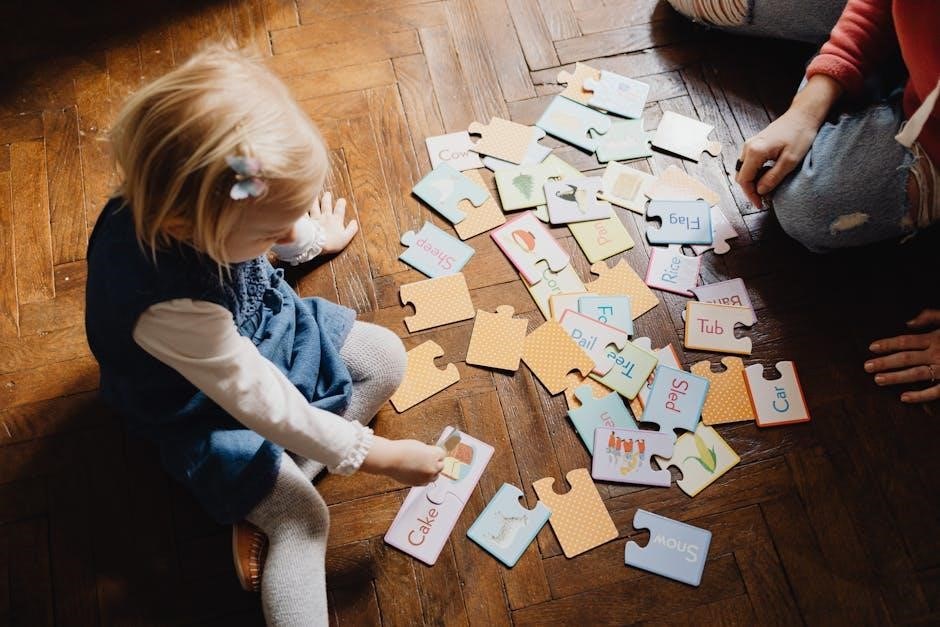Spelling bee words are carefully selected to challenge participants, focusing on pronunciation, roots, and usage. They often include uncommon terms from various fields, requiring precise spelling and comprehension.
1.1 Importance of Spelling Bees in Vocabulary Development
Spelling bees play a crucial role in enhancing vocabulary by exposing participants to diverse words, their meanings, and usage. They encourage deeper understanding of word origins, roots, and pronunciation, fostering improved reading and writing skills. By practicing with flashcards and dictionaries, learners build confidence and mastery, essential for academic and real-world communication. Challenging words like pandemic or abalone illustrate this growth.
1.2 Overview of Common Spelling Bee Words and Their Usage
Common spelling bee words often include challenging terms like abattoir (a slaughterhouse) or chock (to block). These words, drawn from medicine, nature, and daily life, are selected for their unique spellings and meanings. They frequently feature silent letters, double letters, or unusual roots, testing participants’ understanding of word structures and pronunciation. Mastery of these words enhances both spelling proficiency and overall vocabulary.

Benefits of Learning Spelling Bee Words
Learning spelling bee words enhances reading and writing skills, while building confidence for competitions and exams. Regular practice sharpens memory and improves vocabulary, fostering a lifelong love for learning.
Mastering spelling bee words significantly enhances both reading and writing abilities. By familiarizing oneself with complex vocabulary, individuals can decipher unfamiliar words in texts, improving comprehension. Additionally, accurate spelling boosts writing clarity and confidence, making communication more effective. This skill also aids in recognizing word patterns and roots, further strengthening language proficiency and overall academic performance. Learning spelling bee words instills a sense of accomplishment and self-assurance, crucial for competitions and exams. Consistent practice helps participants anticipate and manage pressure, fostering resilience and composure under scrutiny. This confidence often translates into improved performance in various academic and extracurricular challenges, as learners develop a mindset geared toward success and overcoming obstacles with determination and poise. Effective preparation involves using flashcards, studying word roots, and practicing with sample sentences. Regular practice helps build familiarity and mastery of challenging vocabulary, ensuring readiness for competition. Flashcards are a powerful tool for spelling bee preparation. Write the word on one side and its definition, pronunciation, and a sample sentence on the other. Regular review helps reinforce memory. Start with basic words, gradually increasing difficulty. This method ensures consistent practice, making complex words easier to memorize and spell accurately during competitions. Consistency is key to success. Practicing with sample sentences and definitions enhances understanding and retention of spelling bee words. Seeing words in context helps learners grasp their meanings and usage. Definitions clarify nuances, while sentences demonstrate practical applications. This dual approach not only improves spelling accuracy but also strengthens vocabulary and comprehension skills, essential for confident participation in competitions and everyday communication. Regular practice with varied examples ensures mastery. Abalone: A type of marine snail. Example: “The diver found an abalone shell underwater.” Abattoir: A slaughterhouse. Example: “The town relied on the local abattoir for meat production.” Chiaroscuro: An artistic technique using strong contrasts of light and dark. Example: “The painting’s chiaroscuro created a dramatic effect.” Schadenfreude: Pleasure derived from others’ misfortune. Example: “He felt schadenfreude when his rival lost the competition.” Thixotropy: A property of certain gels to become less viscous when agitated. Example: “The engineer studied thixotropy in new materials.” Abalone: A large sea mollusk, often used in cuisine. Example: “The chef prepared abalone as a delicacy.” Abattoir: A facility for slaughtering animals. Example: “The abattoir adhered to strict hygiene standards.” Carotenoid: Pigments in plants, like orange and yellow. Example: “Carotenoids protect plants from sunlight damage.” Mastering spelling bee words involves using flashcards, studying word roots, and practicing with sentences. Utilize digital tools and interactive resources for effective and engaging learning. Understanding word roots and pronunciation is crucial for spelling success. Many words share Latin or Greek origins, offering clues to their meanings and spellings. Pronunciation guides help identify syllable stress and vowel sounds, reducing errors. Breaking down words into their components enhances recognition and retention, making complex spellings more manageable and boosting confidence in competitions. This approach ensures a solid foundation for mastering challenging vocabulary. Mnemonics and visualization are powerful tools for spelling mastery. Creating mental images or associations helps link words to their meanings, making them easier to recall. Techniques like acronyms or rhymes can encode spellings, reducing forgetfulness. Visualization engages the brain creatively, enhancing memory retention and improving accuracy. These methods empower learners to tackle complex words with confidence and efficiency, especially under competition pressure. Teachers and parents play a crucial role by creating interactive activities and providing encouragement. They help tailor learning to individual needs, fostering a supportive environment for mastery. Teachers and parents can design engaging activities like quizzes, word puzzles, and games. These methods make learning spelling bee words fun and effective. For instance, using flashcards or apps like Spelling Bee Buddy can help students practice in an interactive way. Additionally, incorporating word origins and definitions into games enhances retention and understanding. This approach keeps students motivated and excited about learning new words. Constructive feedback is crucial for improvement. Teachers and parents should highlight strengths and gently correct mistakes. Positive reinforcement boosts confidence, while specific suggestions guide further practice. Encouraging learners to reflect on their progress fosters a growth mindset. Timely and supportive communication helps students stay motivated and resilient, especially when tackling challenging spelling bee words. This supportive approach ensures steady growth and mastery. Spelling bees enhance vocabulary by introducing complex words, while improving grammar through context and sentence usage. They foster a deeper understanding of word origins and structures. Studying spelling bee words improves grammar by focusing on word roots, prefixes, and suffixes. Understanding these elements helps identify parts of speech and sentence structure. Analyzing word meanings and usage in sentences enhances comprehension and application in writing. This approach fosters a stronger connection between vocabulary and grammar, making language use more precise and effective. Exploring word origins enriches vocabulary by connecting terms to their historical and cultural roots. Understanding etymology helps decode meanings and usage in context. Learning how words evolve and are applied in sentences broadens linguistic appreciation. This knowledge enhances communication and fosters a deeper understanding of language diversity and complexity. It also aids in recognizing patterns and relationships between words. Digital tools like Spelling Bee Buddy and interactive apps provide personalized practice, offering definitions, sentences, and real-time feedback. These resources enhance efficiency and engagement in learning. Spelling Bee Buddy offers real-time personalized hints and analysis, enhancing practice efficiency. It provides definitions, sentences, and feedback, making learning engaging. Other tools, like apps and websites, deliver interactive exercises, quizzes, and games. These resources cater to diverse learning styles, ensuring comprehensive preparation and mastery of spelling bee words through dynamic and adaptive approaches. Apps and websites provide tailored learning experiences, offering customizable lists and progress tracking. They feature interactive drills, quizzes, and games to make practice enjoyable. Many include audio pronunciations, example sentences, and definitions, ensuring a holistic understanding of each word. These tools adapt to individual skill levels, fostering improvement and confidence in spelling bee preparation through consistent and engaging practice. Common mistakes include overlooking silent letters, double letters, and mispronouncing words. Mishearing sounds or confusing similar letters can lead to errors. Practice and careful listening are essential. Silent letters, like in “chock” or “abattoir,” can deceive spellers. Double letters, such as in “committee” or “necessary,” are often missed. These errors stem from poor auditory clues or rushed spelling. Practicing word lists that highlight these patterns helps build awareness and accuracy, reducing common mistakes in spelling bees. Regular drills and attention to word structure are essential to master these challenging aspects. Mispronouncing words can lead to spelling errors, as seen with “chock” or “abattoir.” Contestants often struggle with unfamiliar terms, mishearing sounds or syllables. Requesting words in sentences helps clarify meaning and pronunciation, reducing mistakes. Regular practice with audio resources and word origins improves accuracy and confidence, ensuring correct spelling even of challenging vocabulary. This skill is crucial for success in competitive spelling environments. Spelling bee skills enhance communication, boost academic performance, and improve career prospects by fostering strong vocabulary and precise expression in professional and personal interactions daily. Mastering spelling bee words significantly enhances communication skills, enabling clearer expression of ideas in both written and spoken formats. Academically, it boosts performance by improving reading comprehension, writing accuracy, and overall confidence in using complex vocabulary effectively in various subjects and standardized tests, leading to better grades and a stronger academic foundation for future success and personal growth.
A robust vocabulary, refined through spelling bee preparation, is a valuable asset in professional settings, enhancing written and verbal communication, and demonstrating intellectual capability. It opens doors to careers requiring precision and expertise, such as editing, law, and academia, while also fostering credibility and confidence in workplace interactions, making individuals more competitive and desirable candidates in their chosen fields of expertise. Consistent practice and persistence are key to mastering spelling bee words. Use interactive tools, focus on word roots, and celebrate progress to achieve long-term success. Consistency is vital for mastering spelling bee words. Set aside time daily to practice, using flashcards or interactive tools. Track progress and focus on challenging words. Persistence builds confidence and reduces exam anxiety. Regular practice helps reinforce memory and improves accuracy over time, ensuring long-term success in spelling competitions and beyond. Stay committed to your goals. Mistakes are an essential part of the learning process in spelling bees. Analyze errors to understand patterns and improve strategies. Use online tools or flashcards to revisit challenging words. Embrace difficult spellings as opportunities to grow. Building confidence comes from perseverance and learning from setbacks. Each mistake brings you closer to mastery and enhances your overall vocabulary and spelling skills.2.1 Improving Reading and Writing Skills
2.2 Building Confidence for Competitions and Exams

How to Prepare for a Spelling Bee
3.1 Using Flashcards for Effective Memorization
3.2 Practicing with Sample Sentences and Definitions
Example Spelling Bee Words with Definitions and Sentences
4.1 Challenging Words and Their Meanings
4. Related to Medicine, Nature, and Daily Life

Strategies for Mastering Spelling Bee Words
5.1 Understanding Word Roots and Pronunciation
5.2 Using Mnemonics and Visualization Techniques

The Role of Teachers and Parents in Spelling Bee Preparation
6.1 Creating Interactive Learning Activities
6.2 Providing Feedback and Encouragement

The Impact of Spelling Bees on Vocabulary and Grammar
7.1 Enhancing Grammar Awareness Through Word Study
7.2 Expanding Knowledge of Word Origins and Usage

Using Digital Tools for Spelling Bee Practice
8.1 Spelling Bee Buddy and Other Interactive Tools
8.2 Apps and Websites for Personalized Learning
Common Mistakes to Avoid in Spelling Bees
9.1 Overlooking Silent Letters and Double Letters
9.2 Mispronouncing Words and Their Meanings
Real-Life Applications of Spelling Bee Skills
10.1 Improving Communication and Academic Performance
10.2 Enhancing Career Opportunities Through Strong Vocabulary
11.1 Staying Consistent and Persistent in Practice
11.2 Embracing Challenges and Learning from Mistakes
